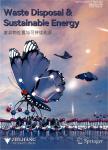Fermentative bio-hydrogen production using lignocellulosic waste biomass:a revie
作者机构:School of Life ScienceDevi Ahilya Vishwa VidyalayaIndoreMadhya PradeshIndia Department of Research and DevelopmentUniversity of Petroleum and Energy StudiesDehradunIndia Department of BiosciencesAcropolis InstituteIndoreMadhya PradeshIndia
出 版 物:《Waste Disposal and Sustainable Energy》 (废弃物处置与可持续能源(英文))
年 卷 期:2020年第2卷第4期
页 面:249-264页
核心收录:
学科分类:083002[工学-环境工程] 0830[工学-环境科学与工程(可授工学、理学、农学学位)] 08[工学]
基 金:Devi Ahilya Vishwa Vidyalaya University of Petroleum and Energy Studies
主 题:Bio-hydrogen Biofuel Lignocellulosic waste Second-generation biofuels Factors affecting bio-hydrogen production
摘 要:Solid waste management needs,increasing pollution level by burning or dumping of waste,and the use of fossil fuels and depleting energy resources are a few of the problems of the decade that need to find *** of lots of compound polymers-rich biomass waste is done worldwide by dumping on land or into water bodies or else by incineration or long-term storage in an available facility *** kind of disposal instead becomes a reason to add the soil,water,and air pollution.A lot of multidisciplinary collaboration in different streams of science and technology has added to the efficiency of using such waste for use as an alternative energy form,like biogas and *** use of biogas plants for converting biological waste into methane using municipal solid waste(MSW)is known since a long *** with MSW,a lot of other agricultural waste and kitchen waste are also added every day to *** the complex components of such waste material like lignocellulosic wastes still don’t pass the test of qualifying as a resource for biogas and even more energy-efficient and cleaner biofuel,*** may be because of its complicated structure and a lot of parameters that affect its use for converting it into *** review is designed to analyze and compare these parameters for optimum lignocellulosic waste conversion,more specifically agriculture and food waste,into cleaner energy forms that would help to tackle the solid waste management and air pollution control more effectively.



